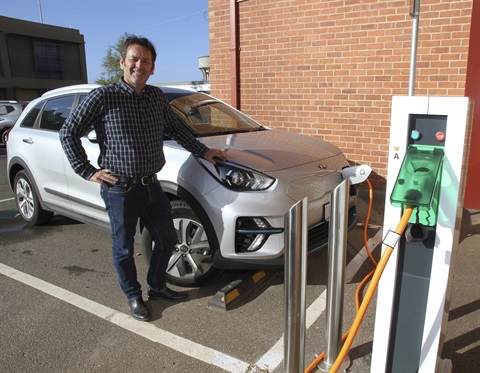
Mildura Rural City Council continues to lead the way in slashing carbon emissions and transitioning to renewable energy with the introduction of the organisation’s first electric vehicles (EVs).
Council has just taken delivery of three EVs, featuring driving ranges of between 263 and 455 kilometres.
They include the Mayor’s vehicle, which he uses to visit towns and communities across the Mildura Council area, as well as travel to required conferences and meetings in other parts of Victoria representing the municipality.
Councillor for Environment and Sustainability Jodi Reynolds said the new EVs would slash running and maintenance costs compared to their petrol or diesel equivalents, costing less than $5 to fully charge and requiring much less maintenance – for example they don’t need engine oil changes.
Cr Reynolds said transitioning to EVs will also drive down greenhouse emissions, given Council’s fleet accounts for about 25% of the organisation’s overall emissions, excluding landfill.
Charging stations have been installed at Council’s Deakin and Madden Avenue service centres, meaning the three new vehicles are powered by 100% renewable energy following Council’s recent inclusion in the Victorian Energy Collaboration.
All three vehicles were purchased from local dealerships, which is where they will be serviced.
In another exciting step forward for renewable energy-powered transport in our region, Ouyen’s EV fast charging station recently came online.
Based at the Ouyen Community Park, the facility is the second public charging station in the region and was established through a collaborative effort between Council, the Central Victorian Greenhouse Alliance (CVGA), Ouyen Inc., the Victorian Government and Evie Networks.
Part of the CVGA-led Charging the Regions project, it’s one of 23 public EV fast chargers across 21 cities and towns in regional Victoria. Council was among six participating municipalities to share in $664,000 in Victorian Government funding last year.
“This network of fast chargers means there are charging points every 100 kilometres between Mildura and Melbourne,” Cr Reynolds said.
“This will help boost the adoption of EVs in regional areas, reduce range anxiety and make it easier than ever for tourists who own EVs to visit our region, which given the financial impact of the pandemic on our tourism sector over the past 18 months will certainly be welcomed.”
Mildura Mayor Jason Modica said the new charging stations and additions to Council’s vehicle fleet coincided with the release of a new national report highlighting the impact of climate change on local government.
The Climate Council and Cities Power Partnership Report, Neighbourhood issue: Climate costs and risks to councils, described climate change as “an immense challenge for all levels of government, but its impacts are felt most acutely at a local level”.
The report found that critical Council infrastructure such as roads and drainage is being damaged by more frequent and severe weather, as well as other Council-owned assets and buildings.
This results in increasing costs, insurance premiums and liability risks.
The report found that aside from more support from state and Federal governments, combatting climate change should be a major goal for local government to curb the trend of worsening storms and other natural disasters.
Cr Modica said he was proud of the significant progress Council had already made in responding to the climate emergency.
“A key message from the report is that all levels of government need to ramp up their climate action and reduce emissions this decade,” Cr Modica said.
“Fortunately, we’re well on the way to doing that, and this week’s announcements are the latest in a broad suite of measures and actions we’ve taken as a Council to do our part.”
Most recent measures include:
- Council declared a Climate Emergency in February 2020, becoming the 30th local government in Victoria and the 94th in Australia to take this action.
- Established a Climate Emergency Community Action Group in July 2021. The group is working with Council to develop a community Climate Emergency Plan
- Made the switch to using 100% renewable electricity for Council buildings, facilities and public lighting as one of 46 Councils to sign up to the Victorian Energy Collaboration in July 2021.
- Adopted Council’s Towards Zero Emissions Strategy 2021-2050 in June 2021.
- Continuing the installation of solar PV on Council buildings – so far over 600 kilowatts of solar PV has been installed.
The Cities Power Partnership is Australia’s largest group of cities and towns working to tackle climate change, with over 145 partner Councils including Mildura that represent almost 60% of the Australian population. To download Neighbourhood issue: Climate costs and risks to councils visit citiespowerpartnership.org.au




